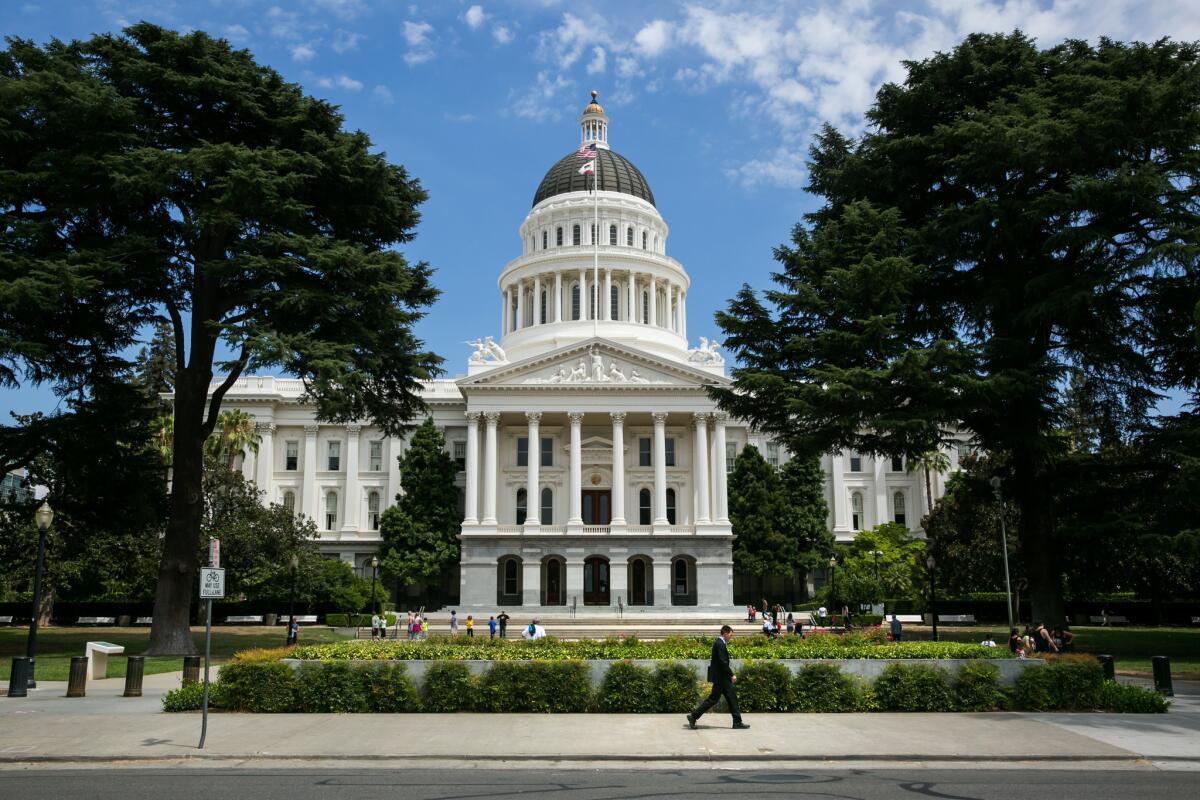‘Citizens United’ advisory measure can go on ballot, California high court says

- Share via
Reporting from San Francisco — Nearly three years ago, the Legislature placed an advisory measure on the ballot asking voters to weigh in on the Supreme Court’s ruling in the Citizens United case, which struck down certain campaign spending limits.
A conservative group sued and succeeded in getting the measure yanked from the ballot.
On Monday, the same court that took the measure off the ballot decided 6 to 1 that it could go back on.
The decision by the California Supreme Court, handed down in 143 pages with separate opinions from four justices, said the Legislature may place advisory measures on the ballot as long as there is a “nexus” between the proposition and actions the Legislature might take in the future.
Though the holding was narrow and aimed squarely at the Citizens United proposition, election experts said they expect the Legislature to authorize more such measures in efforts to manipulate voter turnout.
Join the conversation on Facebook >>
“The reason this is going on the ballot is not because the Legislature needs advice, but as a way of getting Democrats and others excited,” said UC Irvine law professor Richard L. Hasen, an expert on election law. “Citizens United was a polarizing opinion, and it is very unpopular.”
Democrats have used minimum-wage measures to attract Democratic voters, and Republicans have used same-sex marriage bans to lure Republicans to the polls, Hasen said. More than a dozen other states permit their legislators to put advisory measures on statewide ballots.
“Trying to manipulate the ballot for politics is not new,” Hasen said. “This just gives the Legislature one more tool to do that.”
Dan Schnur, who directs the Jesse M. Unruh Institute of Politics at USC, called the Citizens United measure a “fairly transparent way of attempting to boost Democratic turnout in November.”
“Once you have been given the green light to put an initiative on the ballot for only symbolic value, it is going to become very addictive,” Schnur said. “There is no disincentive to do this year in and year out.”
The California Supreme Court “seems to have decided that using ballot initiatives as a voter turnout mechanism is perfectly legal,” he said.
SIGN UP for the free Essential Politics newsletter >>
The proposition authorized by the Legislature asks voters whether there should be a federal constitutional amendment to overturn the ruling in Citizens United vs. Federal Election Commission, which permitted unlimited corporate and union spending for federal candidates.
Justice Kathryn Mickle Werdegar, writing for the court majority, said the referendum was related to legislative duties because state legislatures have a role in passing federal constitutional amendments.
“Legislators may solicit and consider the views of the people on fundamental matters pertaining to federal constitutional amendments,” Werdegar wrote.
Chief Justice Tani Cantil-Sakauye, who cast the sole vote in 2014 to allow the measure to remain on the ballot, said she joined the opinion because it did not broadly restrict the Legislature’s powers.
“Nothing in today’s decision should be viewed as calling into question the validity of all types of statewide and local advisory ballot measures, even those completely unrelated to any proposed amendment to the federal Constitution,” the chief justice wrote.
Justice Carol A. Corrigan agreed. “Advisory measures that are reasonably related to any proper use of legislative power are permissible,” she wrote.
Justice Ming W. Chin dissented, saying the measure should stay off the ballot.
“The Legislature should not be permitted to hijack the ballot to serve its own agenda,” Chin wrote.
Justice Goodwin Liu did not sign the majority decision. In a concurring opinion, he said he agreed that the Citizens United measure was appropriate for the ballot but argued that most such measures should be barred.
“A legislative majority opposed to an initiative could swell the ballot with advisory measures on the same subject,” Liu wrote. “Such an approach would be much easier than qualifying a competing initiative but no less effective in confusing and exhausting the electorate.”
Thomas W. Hiltachk, who represented the Howard Jarvis Taxpayers Assn., which challenged the ballot measure, said the Legislature will have to pass another law to get it on November’s ballot.
If the Legislature views the ruling as an invitation to authorize all sorts of advisory measures, “the problems we are concerned about will arise again and we will take them on again,” Hiltachk said.
Lawyers for the Legislature have been asked to determine whether the secretary of state has the authority to put the measure on the November ballot or whether a new bill must be introduced.
“I certainly expect it to be on the ballot one way or another,” said Derek Cressman, who was the campaign manager for the proposition before it was removed from the ballot.
U.S. Rep. Ted Lieu (D-Torrance), who sponsored the measure when he was in the California Legislature, said he “absolutely” believes the measure will go before voters in November, even if it requires another bill.
“I don’t see any reason for it not to pass again,” he said.
Twitter: @mauradolan
ALSO
First El Niño rain hits L.A.; bigger storms later in the week
Employees return to site of San Bernardino terrorist attack
Man who allegedly killed father in Rowland Heights shooting is released











